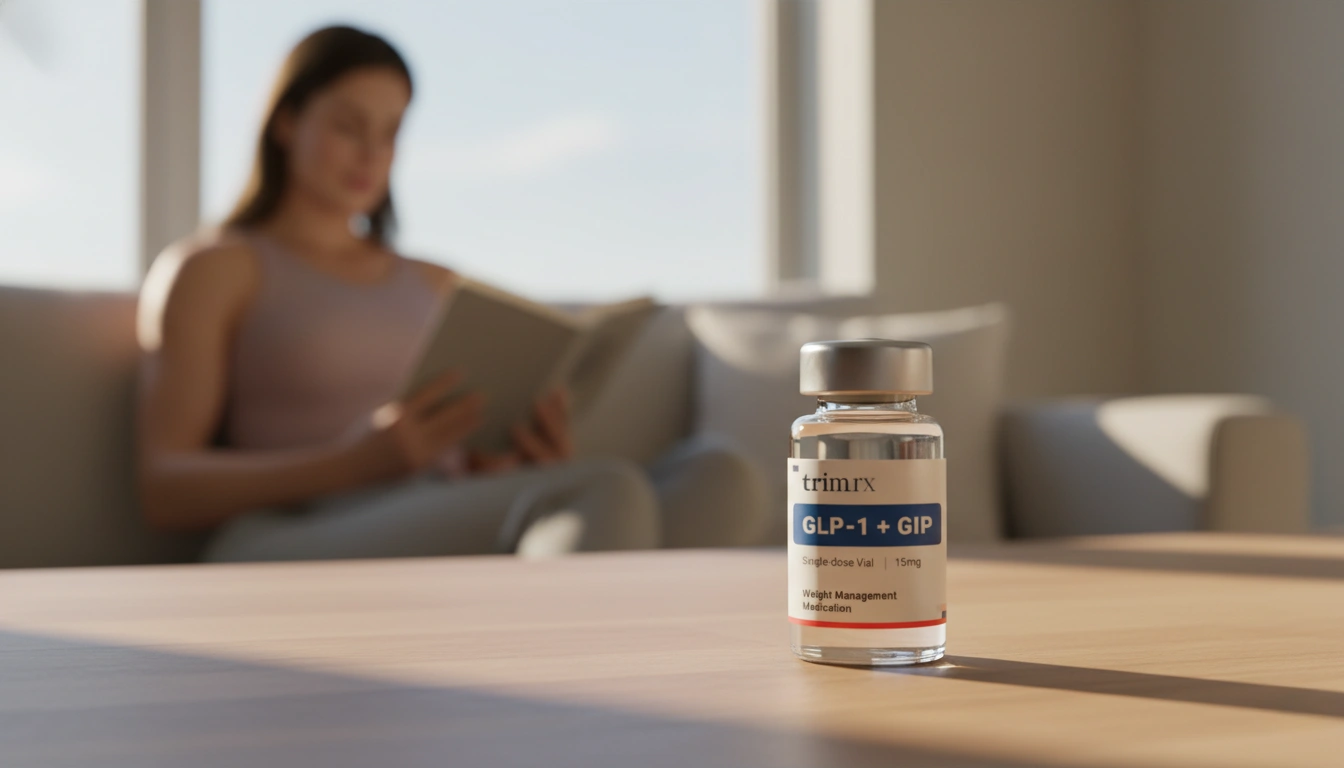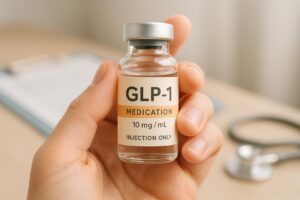Does GLP-1 Cause Fatigue? Exploring the Relationship Between GLP-1 Medications and Energy Levels

The journey toward achieving a healthy weight often brings with it a myriad of questions and concerns. One of the more common inquiries we’ve encountered at TrimRx is whether GLP-1 (glucagon-like peptide-1) medications lead to feelings of fatigue. As more individuals turn to these innovative treatments for weight management and diabetes, understanding their side effects becomes increasingly important. In this blog post, we will delve into the intricate relationship between GLP-1 medications and fatigue, exploring the underlying mechanisms, research findings, and strategies for managing this potential side effect.
Introduction
Have you ever felt unusually tired after starting a new medication? If you’re considering or currently using GLP-1 medications, you might be among those who have experienced this unsettling sensation. In fact, studies indicate that fatigue can be a common side effect during the initial weeks of treatment. This post aims to shed light on the connection between GLP-1 medications and fatigue, examining why this might occur and what you can do about it.
As we navigate this topic, we will cover the mechanisms by which GLP-1 medications function, the potential reasons behind fatigue, and strategies to mitigate this side effect. By the end of this post, we hope to empower you with the knowledge needed to make informed decisions about your weight loss journey and overall health.
Together, we will explore how GLP-1 medications impact energy levels, the science behind our body’s adaptation to these medications, and the importance of personalized care—something we prioritize here at TrimRx. Let’s embark on this journey toward understanding the complexities of GLP-1 medications and fatigue.
Understanding GLP-1 Medications
What Are GLP-1 Medications?
GLP-1 medications, such as Ozempic®, Wegovy®, and Mounjaro®, are a class of drugs designed to help manage blood sugar levels and facilitate weight loss. These medications work by mimicking the action of the natural hormone glucagon-like peptide-1, which is released in response to food intake. This hormone has several significant effects on the body:
- Enhancing insulin secretion: GLP-1 medications stimulate the pancreas to release insulin, a hormone that helps lower blood sugar levels.
- Inhibiting glucagon release: Glucagon is a hormone that raises blood sugar levels; by inhibiting its release, GLP-1 medications help maintain steady glucose levels.
- Slowing gastric emptying: These medications delay the rate at which food leaves the stomach, leading to increased satiety and reduced appetite.
The combined effects of these actions can lead to significant weight loss, making GLP-1 medications a popular choice for those looking to manage their weight effectively.
The Rise in Popularity of GLP-1 Medications
The increasing prevalence of obesity and type 2 diabetes has driven interest in GLP-1 medications. According to the Centers for Disease Control and Prevention (CDC), more than 42% of adults in the United States are classified as obese. This statistic highlights the urgent need for effective weight management solutions. GLP-1 medications have transformed the landscape of weight loss and diabetes management, offering hope to individuals struggling with these challenges.
However, as with any medication, it is essential to understand not just the benefits but also the potential side effects. One side effect that has garnered attention is fatigue.
The Connection Between GLP-1 Medications and Fatigue
Why Do Some Users Experience Fatigue?
As we explore the question of whether GLP-1 medications cause fatigue, it’s vital to consider several factors that may contribute to this sensation. Here are some of the key reasons:
-
Metabolic Adjustment: When starting GLP-1 medications, your body undergoes significant metabolic adjustments. These changes include improved regulation of blood sugar levels, which can temporarily impact energy levels. As your body adapts to new insulin and glucagon responses, feelings of fatigue may arise.
-
Gastrointestinal Side Effects: Many individuals report experiencing gastrointestinal discomfort, including nausea, vomiting, and diarrhea, when beginning GLP-1 treatment. These side effects can be energy-draining and may lead to feelings of fatigue.
-
Dehydration: Gastrointestinal side effects can contribute to dehydration, which is another common culprit behind fatigue. Proper hydration is crucial for maintaining energy levels.
-
Reduced Caloric Intake: GLP-1 medications often lead to a decrease in appetite and subsequent weight loss. For some users, this may result in a lower caloric intake than their bodies are accustomed to, leading to fatigue.
-
Direct Pharmacological Effects: The pharmacological action of GLP-1 medications on the central nervous system may also play a role in feelings of fatigue. While the exact mechanisms are not fully understood, it is believed that the modulation of appetite and energy expenditure can influence energy levels.
Research Insights on GLP-1 and Fatigue
Recent studies have highlighted the prevalence of fatigue among users of GLP-1 medications. According to clinical trial findings, the incidence of fatigue varies but is reported in a minority of patients. In some cases, fatigue may be more pronounced during the initial weeks of treatment, as the body adjusts to the medication and its effects on metabolism.
It is worth noting that while fatigue can be a concern, it often diminishes after the first month as the body adjusts to the new state of metabolic balance. Many patients report an improvement in energy levels once they reach their maintenance dose, illustrating the importance of patience and persistence during the adjustment phase.
Strategies to Manage Fatigue While Using GLP-1 Medications
While fatigue can be an unwelcome side effect, there are several strategies to help mitigate its impact and support your energy levels as you embark on your weight loss journey. Here are some actionable tips:
1. Stay Hydrated
Proper hydration is essential for combating fatigue. Aim to drink plenty of water throughout the day, and consider adding electrolyte-rich fluids if you experience gastrointestinal side effects. Electrolytes can help ensure that the fluids you consume are effectively utilized by your body.
2. Focus on Nutritional Quality
Eating a balanced diet rich in nutrients can help support your energy levels. Even if your appetite decreases, prioritize nutrient-dense foods that provide essential vitamins, minerals, and macronutrients. Consider incorporating:
- Lean proteins: Foods like chicken, fish, legumes, and plant-based proteins can help maintain muscle mass and provide sustained energy.
- Complex carbohydrates: Whole grains, fruits, and vegetables offer fiber and energy without causing spikes in blood sugar.
- Healthy fats: Sources like avocados, nuts, and olive oil can provide lasting energy and support overall health.
3. Eat Smaller, Frequent Meals
If you’re experiencing reduced appetite, consider eating smaller, more frequent meals throughout the day. This approach can help maintain stable blood sugar levels and provide a consistent energy supply. Aim to include protein in each meal or snack to support energy levels.
4. Incorporate Moderate Exercise
Engaging in regular, moderate exercise can enhance circulation, improve metabolic function, and help combat fatigue. Even light activities like walking or yoga can make a difference in your energy levels. Aim to incorporate at least 30 minutes of physical activity most days of the week.
5. Maintain Good Sleep Hygiene
Quality sleep is crucial for overall well-being and energy levels. Establish a consistent sleep schedule by going to bed and waking up at the same time each day. Create a restful environment by keeping your bedroom cool, dark, and quiet, and avoid screens before bedtime to improve sleep quality.
6. Monitor Your Blood Sugar Levels
Keep an eye on your blood sugar levels, especially if you are using GLP-1 medications. Fluctuations in blood sugar can lead to feelings of fatigue. By recording your levels, you can identify patterns and discuss any necessary adjustments with your healthcare provider.
7. Consult Your Healthcare Provider
If you experience persistent fatigue, it’s essential to communicate with your healthcare provider. They can evaluate your medication regimen, consider adjustments, and explore other potential underlying causes of fatigue.
Conclusion
Understanding the relationship between GLP-1 medications and fatigue is crucial for anyone considering or currently using these treatments. While fatigue can be a common concern, it is often temporary and can be managed with the right strategies. By maintaining proper hydration, focusing on nutritional quality, engaging in regular physical activity, and monitoring your health, you can navigate potential challenges and stay on track toward achieving your weight loss goals.
At TrimRx, we are committed to providing personalized, medically supervised weight loss solutions, ensuring that our clients feel supported every step of the way. If you’re considering GLP-1 medications or are already on a treatment plan, we encourage you to take our free assessment quiz to explore your options and receive a personalized treatment plan tailored to your unique needs.
Together, let’s embrace the journey toward a healthier lifestyle, armed with knowledge and support. Reach out to us today to learn more about our offerings, including our quick-access supplements like the GLP-1 Daily Support and Weight Loss Boost, designed to enhance your weight loss journey.
FAQ
How long does fatigue last when starting GLP-1 medications?
Fatigue is commonly experienced in the initial weeks of treatment as your body adjusts. Most patients find that this sensation diminishes within the first month, particularly as they reach their maintenance dose.
Are there specific dietary recommendations to combat fatigue?
Focus on a balanced diet rich in lean proteins, complex carbohydrates, and healthy fats. Eating smaller, more frequent meals can also help maintain stable energy levels.
Should I consult my healthcare provider if I experience fatigue?
Yes, it’s essential to communicate any persistent fatigue with your healthcare provider. They can evaluate your medication regimen and explore other potential causes of fatigue.
Can hydration help with fatigue?
Absolutely! Staying well-hydrated is crucial for maintaining energy levels, especially if you’re experiencing gastrointestinal side effects from GLP-1 medications.
What are some strategies for managing fatigue while on GLP-1 medications?
Strategies include staying hydrated, focusing on nutritional quality, eating smaller meals, incorporating moderate exercise, maintaining good sleep hygiene, and monitoring blood sugar levels.
By understanding the mechanisms behind GLP-1 medications and implementing practical strategies, you can effectively manage fatigue and continue on your path to health and wellness.

Transforming Lives, One Step at a Time
Keep reading
GLP-1 Medication Side Effect Checker
Worried about GLP-1 medication side effects? Use our free checker for Semaglutide, Liraglutide, and more to learn what to expect and stay informed!
GLP-1 Dose Titration: Research Insights
Gradual GLP-1 dose increases balance weight loss and GI side effects; personalized titration and monitoring improve real-world outcomes.
Wave Life Sciences unveils Phase I results for obesity treatment
Wave Life Sciences’ single-dose RNA therapy showed 4% total body fat reduction and promising Phase I results.



